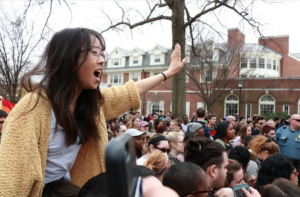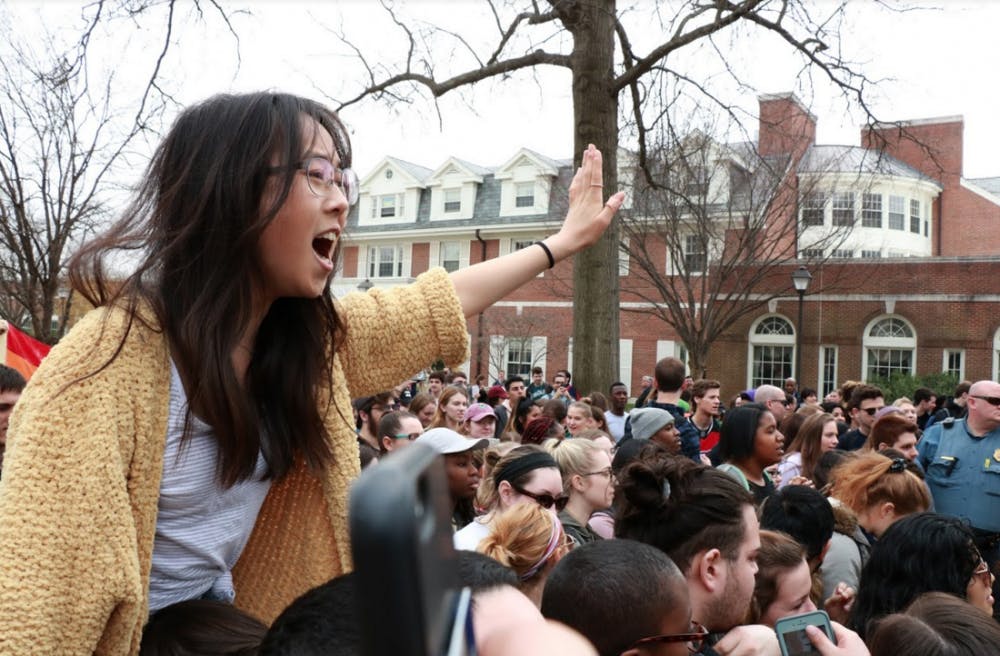By Grant Playter
Staff Writer
Members of the radical religious group known as the Bible Believers came to the College on April 12, wielding signs that displayed hateful and discriminatory language.
“Jesus or hellfire,” “Women belong in the kitchen” and “Feminists are whores,” were just a few of the many signs the Believers held as they spouted their rhetoric to an angry crowd of students.

Lost in the anger felt by members of the campus community, however, are the numerous infractions against campus policy committed by the Bible Believers during their tenure on campus.
Two students did not want these infractions to be pushed under the rug. Alina Osborn, a junior biology major, and Emily Zbyszynski, a junior English major, compiled a 10-page document outlining campus policy and the infractions the Bible Believers committed shortly after the group first visited the campus.
The majority of their document concerns Title IX violations. Title IX is a policy which prohibits sexual assault, dating and domestic violence, sexual harassment, stalking and other power based personal violence.
Osborn and Zbyszynski asserted the Bible Believers committed acts considered to be sexual harassment, which included telling women they deserve to be raped, referring to students as “vagina lickers,” and in one instance, calling a student a “cum-guzzling faggot.”
The group frequently targeted students’ ethnicity, religion and sexuality, and these remarks were logged in the report.
A survey conducted measuring students’ reactions to the protest received 112 total responses, however, Qualtrics flagged 43 responses as spam. Therefore, data was only taken from the remaining 69 responses.
56 percent of respondents felt personally “victimized, harassed or otherwise put in a hostile environment” by the group, while 77 percent stated that they knew someone who fell in that category. Additionally, 61 percent of respondents felt that the group did not act in a manner that should have allowed them to return to campus, and 19 percent of respondents to the same question felt that they probably should not be allowed to return.
Notably, 40 percent of respondents felt specifically that the group “definitely did not” act in compliance with campus policy in their demonstration, with an additional 15 percent stating that they “probably did not” act in compliance.
Kerri Thompson-Tillett, associate vice president and chief diversity officer at the College, offered some of her insights on campus policy — while members of the campus community have to be mindful of their speech, that same rule does not extend to outsiders.
“I can’t enforce that policy against people that are not members of our community,” Thompson-Tillett said.
Since the College is a public school, it must allow public access to its campus. According to the survey, 95 percent of the students who responded said they were made aware that the College is a public campus after the Bible Believers had arrived.
Additionally, 77 percent stated they were familiar with the distinction between how public and private colleges handle group demonstrations.
The survey showed that only 53 percent of respondents were slightly or completely unfamiliar with the College’s policy, while 16 percent were extremely or very familiar with the College’s policy. The results demonstrate the problems presented by the Bible Believers in defining their presence on campus, the resulting outcry from students and the tough position the College’s administration was put in.
College Spokesman Dave Muha emphasized how universal the freedom of speech is.
“The freedom of speech is a constitutionally guaranteed right, so that’s the law of the land,” Muha said. “What the Bible Believers were saying — again, I don’t condone it, I don’t subscribe to it, but I do recognize that I can go to NYC and hear that same kind of message as I’m walking through Times Square. It’s protected speech in Times Square, it’s protected speech here.”
According to Muha, the vetting process for groups who wish to use campus grounds is an application indicating what the grounds will be used for and for how long. There is no censure of topics because, as a public space, the First Amendment protects groups from that censure.
“Was what the Bible Believers saying against the values of the institution? Absolutely. Can I understand that some students were upset what they heard? Absolutely, But nonetheless, based on the law of the land the determination by those at the site was that what was being said did not rise to the level of harassment as defined by the law of the country. That, I think, is the distinction,” Muha said.
Muha explained that what the group was saying was objectionable, but did not fall within the boundaries of harassment, as its legally defined, by the various police agencies at the demonstration, which included campus, Ewing and State Police.
“A lot of (the discussion) centers around the notion that students feel harassed, that theBible Believers were harassing students,” Muha said. “In the instance of those two protests, if you will, police on the grounds had to make a determination based on what they were observing and how that relates to freedom of speech protected by the constitution.”
Muha, along with Thompson-Tillett, repeatedly and vehemently disavowed what the group, but also maintained that the Bible Believers complied with requests from administration and did not directly threatened the safety of students during both incidents.
“I would say that there’s a difference between feeling safe and feeling comfortable.” Muha said. “I don’t feel that at any point in time, on either visit of the Bible Believers, that anybody was unsafe … there was a lot of attention given to make sure there was separation between theBible Believers and the members of our community.”
After the incident, administration and students alike are attempting their own methods of action.
“We are looking to bring somewhat of a First Amendment, free speech expert to campus before graduation because members of the community are really interested in these issues,” Thompson-Tillett said. “While we know a lot, we are not the experts, so we thought it would be a good idea to bring someone on campus who can speak squarely to these issues within the context of higher education.”
While Thompson-Tillett’s policy evaluation may not lead to a ban on the Bible Believers, Osborn is looking to strengthen support for student diversity.
“A friend and classmate of mine are attempting to bring an LGBTQ+ resource center to campus,” Osborn said. “Next semester we will be doing independent research with the Office of Diversity and Inclusion in attempts to further this.”
Among the many ideas for the LGBTQ+ resource center are additional psychological counseling services for LGBTQ+ students who may not feel comfortable going to Counseling and Psychological Services, as well as specific health services such as hormone treatments for transgender individuals.
“At this time we don’t know the exact timeline over which this would occur,” Osborn said. “It might end up being more like buffing the Office of Diversity itself so it’s more equipped to deal with these sort of issues.







